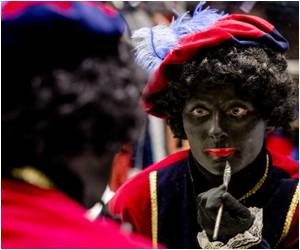In the Netherlands, hundreds of people marched to show their support for Black Pete , the traditional Christmas sidekick of Saint Nicholas, who has been labelled as racist by critics.

"Some 40 people were dressed as Black Pete," he added.
"Black Pete" accompanies Saint Nicholas during a children's festival on December 5, when the Dutch give gifts to each other.
The character, who arrives on a gift-filled boat from Spain, is typically dressed in a gaudy medieval costume and afro wig, with his face painted black and lips red, prompting charges of racism.
Opponents say the character recalls the time when Dutch colonists exploited slaves, notably in the Caribbean colonies of Suriname and Curacao.
Supporters of "Black Pete" angrily reject such accusations, offended at any suggestion that a character so central to Dutch culture could be racist.
"The working group cannot understand that why it is that people in the Netherlands cannot see that this is a throwback to slavery and that in the 21st century this practice should stop," she told the Eenvandaag show on Tuesday.
Shepherd provoked further Dutch fury by suggesting they adopt a US-style "Santa Claus" instead.
Although opinion is divided in the Netherlands, a Facebook petition set up in support of the tradition had hit more than two million "likes" by Saturday.
The annual festival dates back to the sixteenth century, but the first appearance of "Black Pete" occurred in the 1850s.
Source-AFP
 MEDINDIA
MEDINDIA




 Email
Email




